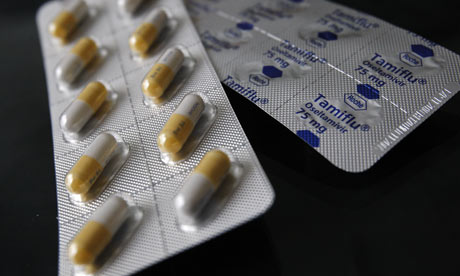
The government's chief medical officer has warned the public against panic-buying swine flu drugs online after it was revealed that the number of new cases of the virus could reach 100,000 per day.
Professor Sir Liam Donaldson said Britain had a large stockpile of Tamiflu, the antiviral drug used to combat infection with the H1N1 virus, and there was no need for people to buy what were likely to be counterfeit medicines on the internet.
His comments came as a 19-year-old man was confirmed today as the fourth person with swine flu to die in the UK. The teenager from south London, who had other serious health problems, tested positive for the virus after his death on Wednesday.
The health secretary, Andy Burnham, yesterday told MPs the spread of swine flu in the UK could no longer be contained.
He said predictions showed the figure of up to 100,000 new cases diagnosed every day could be reached by the end of next month.
In a Commons statement yesterday, Burnham said the country had moved into the "treatment phase" of its response to the flu pandemic.
No more schools will be closed unless forced to by a lack of staff or if pupils are especially vulnerable.
Families and others in contact with infected people will not be given preventative antiviral drugs – a move some doctors predict could push people to go to internet pharmacies.
Donaldson told GMTV there was considerable concern that people might buy counterfeit drugs.
"People shouldn't buy Tamiflu from the internet," he said. "We have got a massive stockpile in this country, and everybody can have access to it through the National Health Service."
The Royal Pharmaceutical Society's director of policy, David Pruce, said most Tamiflu for sale online was probably fake because no legitimate online pharmacy would sell it.
"These sites could be based anywhere in the world," he told BBC Radio 4's Today programme. "They could be selling anything from sugar to rat poison.
"Counterfeiters are very good at producing goods that look like the genuine article. When it's counterfeit medicines and you've got really no idea what's in the tablet or the capsule, you're taking your life in your hands."
Pruce added that while people could get a private prescription for Tamiflu from their GP, there was no point in taking the drug unless they had symptoms.
There are now 7,447 diagnosed cases in the UK, but the number is doubling every week.
People who think they may have flu are advised to go online and check their symptoms on the NHS website or call the swine flu information line on 0800 1 513 513.
Anyone still concerned after that should phone their GP, who can provide a diagnosis over the phone.
If swine flu is confirmed, they will be issued with an authorisation voucher, which a "flu friend" can take to an antiviral drug collection point, which may be a pharmacy or a health centre.
The first doses of swine flu vaccine will arrive in the UK in August. Although the government has ordered enough for the entire population, it will arrive in batches.
At-risk groups – especially those vulnerable because of diseases which have compromised their immune systems or affect their breathing, such as asthma – would get it first.
The shift in the government's swine flu strategy came as the World Health Organisation warned that the spread of swine flu was now "unstoppable", with a total of 112 countries reporting nearly 77,201 infected people and 332 deaths since April.
Dr Margaret Chan, the WHO director general, told an international conference on swine flu in Mexico: "With well over 100 countries reporting cases, once a fully fit pandemic virus emerges its further international spread is unstoppable."
Chan said there was "good reason to believe" the swine flu pandemic would be "of moderate severity, at least in its early days".
But she said that while most deaths had so far occurred in people with serious underlying medical conditions, there were a few exceptions that raised alarm.
"For reasons that are poorly understood, some deaths are occurring in perfectly healthy young people," she said.
"Moreover, some patients experience a very rapid clinical deterioration, leading to severe, life-threatening viral pneumonia that requires mechanical ventilation."
So far, the fatality rate appears to be low. In the UK only four people have died. All had significant underlying health problems.
Jacqui Fleming, 38, of Glasgow, was the first person in the UK to die after contracting the virus. Fleming died last month, two weeks after her son, Jack, was born 11 weeks prematurely. The boy died later but had not contracted the virus.
The second victim was a 73-year-old man from the Inverclyde area of Scotland. Then a week ago today six-year-old Sameerah Ahmad, who was born with a rare life-threatening disease, became the youngest UK victim to date.
Health experts believe more people have caught swine flu but have shown no symptoms.
In the US the official figures show 27,725 Americans have contracted H1N1, with 127 deaths.
The Centres for Disease Control and Prevention, in Atlanta, estimate that one million Americans may have caught swine flu but not been to a doctor, suggesting fatality rates are as low as 0.012%, Burns said.
The European Centre for Disease Prevention and Control reported on Thursday that of 69,177 cases which had been detected worldwide only 328 people had died – a fatality rate of 0.47%.

